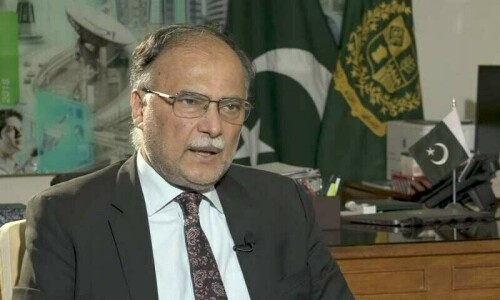- Advertisement -
ISLAMABAD, Apr 15 (APP):Minister for Planning, Development and Special Initiatives Professor Ahsan Iqbal on Tuesday urged leading economists to identify the factors that have repeatedly derailed Pakistan from its development trajectory, highlighting the crucial role of a supportive ecosystem in achieving sustainable national growth.
“The seed of development cannot flourish without an enabling environment — one rooted in peace and harmony, long-term political stability, policy consistency and continuous reform. These are the pillars that successful nations have embraced to reach developed status,” he said.
The minister was addressing the inaugural session of the three-day annual conference of the Pakistan Society of Development Economists (PSDE), organized by the Pakistan Institute of Development Economics (PIDE), under the theme: “URAAN Pakistan: Growth Through Digital Transformation.”
He said the conference reflected a shared national vision to embrace innovation, technology, and strategic planning as tools for inclusive and sustainable progress. “URAAN Pakistan is not just a slogan. It is our commitment to break the cycle of low growth, low productivity, and low ambition.”
Under the current government, he said, URAAN Pakistan was launched as a comprehensive national vision to drive economic, social and digital transformation. “It is more than a metaphor for flight — it is a declaration that Pakistan is ready to take off into a new era of opportunity and innovation.”
Ahsan Iqbal said that Pakistan was not underdeveloped but “undermanaged,” and the time had come to put the country on the course its people rightly deserved.
He highlighted the critical role of economists in shaping development strategies, describing economics as “the queen of the social sciences” that enabled societies to make informed decisions about the use and allocation of scarce resources.
Highlighting the export-driven orientation of URAAN Pakistan, the minister said the initiative opened new avenues for policy-backed trade facilitation, industrial accreditation and regional connectivity. “No country can grow sustainably without increasing its foreign exchange earnings,” he noted.
Through sectoral export strategies, enhanced participation in global trade fairs, and support for manufacturers accessing international markets, the government aims to raise exports to over $60 billion by 2029 – a goal Ahsan Iqbal called achievable and essential for sustained growth.
“Pakistan has long relied on consumption and imports. Now is the time to shift towards growth driven by exports,” he stressed.
He stressed that growth must be inclusive, ensuring equity and poverty alleviation through job creation and youth development. URAAN Pakistan, he said, prioritizes skills training and workforce development to meet the demands of an evolving industrial landscape.
“Nations that embrace technology leapfrog stages of development. Those that resist are left behind. Digitalization is not just about apps and portals — it’s about dismantling red tape and building responsive, intelligent systems,” he remarked.
Ahsan Iqbal described the emergence of “e-Pakistan” as a new pillar of the country’s transformation strategy, focused on reimagining the national economic model through digital ecosystems in fintech, agritech, and greentech – all designed to generate jobs and attract investment.
He said policies were being shaped to position Pakistan as a regional IT hub, supporting artificial intelligence labs, digital finance, cybersecurity, and cloud infrastructure. “Pakistan’s future economic resilience depends on climate-smart planning,” he added.
Recalling the 2022 floods, which caused over $30 billion in damages, he said that the government had launched the Climate Resilient Recovery, Rehabilitation and Reconstruction Framework (4RF) to build back better, integrating resilience into housing, transport and water infrastructure.
He also mentioned the Living Indus Initiative, one of the largest climate adaptation efforts in Pakistan’s history, aimed at restoring ecological balance across the Indus Basin.
Turning to energy, Iqbal said, “Energy is the lifeblood of industrial growth. Pakistan has up to 40 gigawatts of solar and wind potential by 2030. We are inviting private sector participation in green energy, digitalized grids, and infrastructure under public-private partnerships.”
Commenting on past achievements, he credited previous PML-N governments with launching long-term visions such as Vision 2010 and Vision 2025, which laid the groundwork for major national projects including CPEC, energy infrastructure, and knowledge parks.
He called for reviving that spirit through URAAN Pakistan Vision 2035, which envisioned a $1 trillion economy by 2035.
“The challenges we face, from climate change and youth unemployment to productivity gaps, require foresight and discipline. We need to think in terms of decades, not days,” he asserted.
Ahsan Iqbal said the world was moving at digital speed and Pakistan must not lag behind and the time for reflection had over now. “It’s time to act — and together, make URAAN Pakistan a success story of the 21st century,” he remarked.

